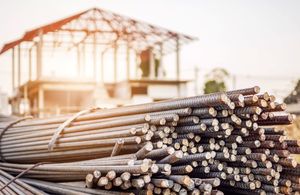UK launches review of steel tariff quotas for imports from Russia and Belarus
The TRA has initiated a Tariff Rate Quota review of steel imports from Russia and Belarus that are part of the UK’s safeguard trade remedy measure.

Rebar
The Trade Remedies Authority (TRA) has today (Wednesday 6 April) initiated a Tariff Rate Quota (TRQ) review of steel imports that are part of the UK’s safeguard trade remedy measure. The TRA will assess whether the tariff rate quotas for Russia and Belarus should be re-allocated to avoid a potential shortage of steel in the UK.
UK to consider adjusting tariff rate quotas to ensure a steady supply of steel
As with any safeguard measure, the UK has given all importing countries a quota to import a certain amount of steel at a basic tariff rate into the UK. Once their quota is exhausted, they have to pay a higher rate. Exporters from Russia and Belarus may not be able to fulfil their quotas because the UK has imposed sanctions on some imports from these countries, including steel. Reallocating the Russian and Belarus quotas could help ensure a regular supply of steel needed for construction, engineering, the automotive industries and other uses.
The TRA’s proposed course of action will be to redistribute the country-specific TRQs for the Russian Federation and the Republic of Belarus to other exporting countries. For more detail of this proposal, view the initiation documents for this review on the TRA’s public file.
A trade remedy framework which adapts to changing circumstances
Tariff Rate Quotas (TRQs) are part of the World Trade Organization (WTO) framework. They specify how much of a product can be imported from a country before its imports are subject to higher tariffs. The UK’s trade remedies system follows WTO rules and is designed to make sure UK industries are not damaged by unfair trade practices or unexpected surges in imports. The TRA manages the UK’s trade remedy measures and has extended a safeguard measure countering steel imports which the UK inherited from the EU system when it left the European Union. The UK has the power to review its Tariff Rate Quotas on imports covered by safeguard measures if circumstances change after the measure is set. This TRQ Review is an economic adjustment to respond to a change of circumstances. TRQs are also reviewed regularly and liberalised progressively.
What this means for importers and users of steel in the UK
The TRA will review steel Tariff Rate Quotas for the Russian Federation and the Republic of Belarus that are part of the UK’s steel safeguard measure and decide if the tariff rate quotas held by Russia and Belarus should be reallocated. The two product categories which may be affected are category 1 (non-alloy and other alloy hot rolled sheets and strips, used in yellow goods, construction, tube-making and the production of downstream steel products) and category 13 (rebars, which are used in construction, the automotive industry, engineering and white goods manufacture).
Oliver Griffiths, TRA Chief Executive, said:
The TRA has the discretion to act quickly when there’s a change of circumstances which affects the UK economy. This review looks to address the risk of a shortage of steel into the UK as a result of sanctions on Russia and Belarus. Reallocating quotas should help keep steel prices down for construction and other domestic industries.
Register your interest in this TRQ review
Businesses which think they may be affected by a change in the quotas (for instance, importers of steel and businesses which use imported steel) can visit the TRA’s public file to find more information. You can also register your interest in the review on the TRA’s online case platform and submit any comments to the TRA by Tuesday 12 April.
Background information/Notes to editors
- Safeguard measures are one of the three types of trade remedies – along with anti-dumping measures which counter goods being dumped in countries at prices below their normal price in their country of origin and countervailing measures against countervailable subsidies – that are allowed under World Trade Organisation (WTO) rules.
- Trade remedy investigations were carried out by the EU Commission on the UK’s behalf until the UK left the EU.
- The Trade Remedies Authority is the UK body that now investigates whether trade remedies measures are needed.
- Forty-four EU trade remedies measures that were of interest to UK producers were carried across into UK law when the UK left the EU and the TRA needs to review each one to check if it is suitable for UK needs.
- As part of this process, the TRA reviewed a safeguard measure on certain steel products, reporting its recommendation in June 2021. The TRA recommended that measures should be extended on some steel products but removed on others, where they were not needed. The TRA has since been asked to reconsider this decision and this process is under way. The reconsideration has been ‘called in’ by the Secretary of State for International Trade and the TRA will complete the reconsideration under her direction.
- The UK regularly reviews its tariff rate quotas (TRQs) to make sure its safeguard measures remain up to date and useful. This is not part of the reconsideration process.